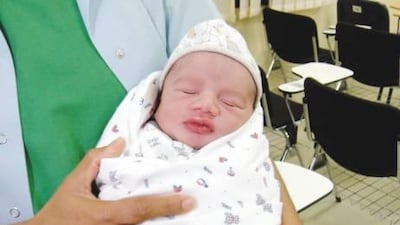UMM AL QAIWAIN // An infant has been found abandoned in an open area in the Al Ramla neighbourhood, authorities have confirmed, the latest in a string of similar cases in the northern emirates.
An Emirati woman called police Wednesday after finding the baby boy crying in the early morning hours near her home, said Col Khalifa Salim al Shamsi of the UAQ police. The baby was taken to the UAQ Hospital for medical tests and was to be kept there until his parents are found or he is deemed fit to be transferred to a care centre.
“It’s likely that the baby had been abandoned that night in the area a few hours after delivery,” he said. “The CID [Criminal Investigations Department] has began its investigations to find the mother.”
Doctors attending to the boy in the hospital said he was in a good and stable condition and was being kept in the nursery until he was deemed strong enough to be transferred.
The number of abandonments has been on the rise in the outer emirates of late, particularly those involving infants. The UAQ Hospital transferred three children of unknown parentage to the Sharjah Social Services Department this week to be kept in the neighbouring emirate’s home-care centres, said Rashid al Shehhi, the hospital’s director general.
“One of those handed to the department was two months old,” Mr al Shehhi said. “Our staff of doctors, nurses and administrators all work together to make these children feel at home while in our hands. They want to give them a home and sense of belonging but not abandonment.” Further details on the recent cases were not provided.
Mr al Shehhi also thanked the charitable organizations that give the children clothing and other gifts. The hospital’s care centre can only house and treat 10 children at a time, necessitating the transfers to Sharjah.
Mariam Mohammed al Suwaidi, the director general of the Sharjah social services department, said that the children they were receiving were not only abandoned children.
“Some children are of unknown fathers, while others are of mothers in jails,” she said. “A jailed mother is allowed to stay with her baby for only two years and if her relatives cannot take the baby or are outside the country, we would take the baby to our care centres.”
She also said her department had an agreement with the Royal Hospital in Sharjah to take care of their babies in case of sickness. Some babies are given to foster parents and the department keeps a watch on them to ensure that they are in safe hands.
Not every such tale ends in sorrow. The UAQ Hospital reunited a six-year-old Omani boy with his father last year after a five-year stay in the hospital care centre.
Separated from his wife in an acrimonious divorce dispute, with a 12-month-old baby boy to bring up on his own and facing imprisonment on charges of having unpaid debts, the father took the only course he believed was open to him. He left the little boy in a child care centre.
After serving his prison term he returned to Oman. Authorities traced him there and reunited him with the little boy he left behind.
The issue of abandoned children has become a hot-button topic in the northern emirates of late, with at least one such report coming to light every few months.
Police have occasionally been successful in locating and apprehending parents of abandoned babies. The parents of two babies left in a Sharjah mosque were arrested in August. Ajman police detained the parents of a baby girl found in a basket last year.
ykakande@thenational.ae

